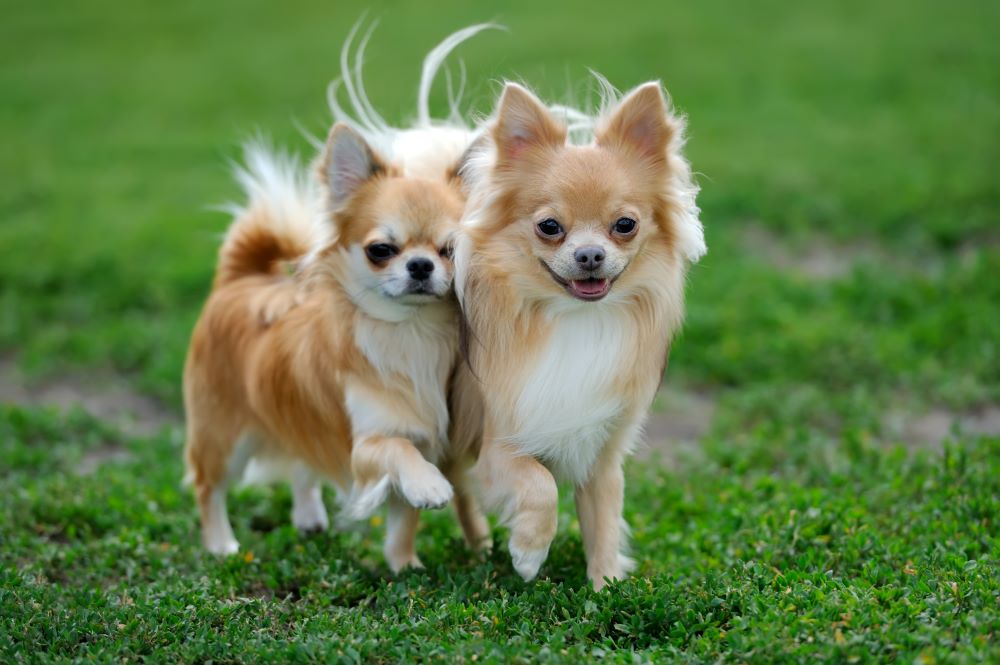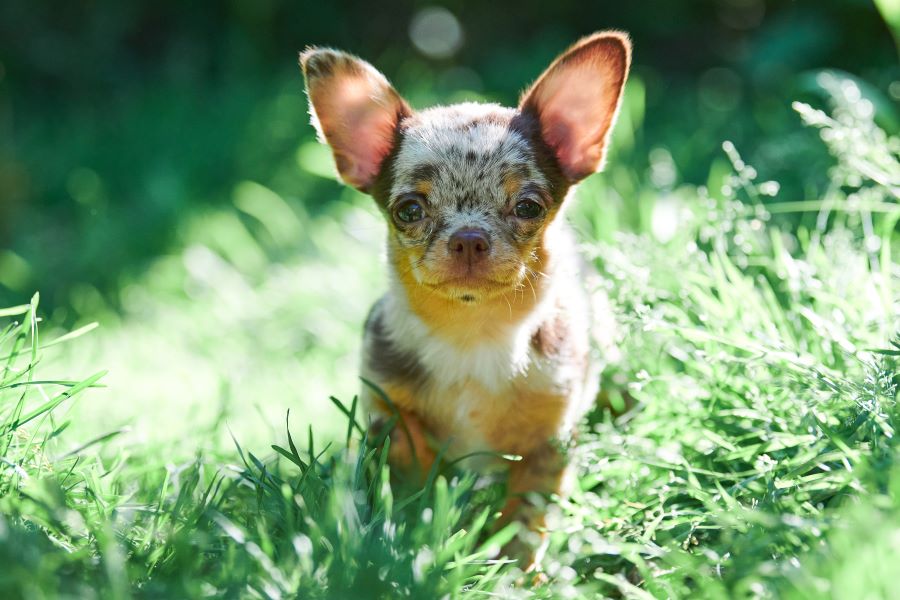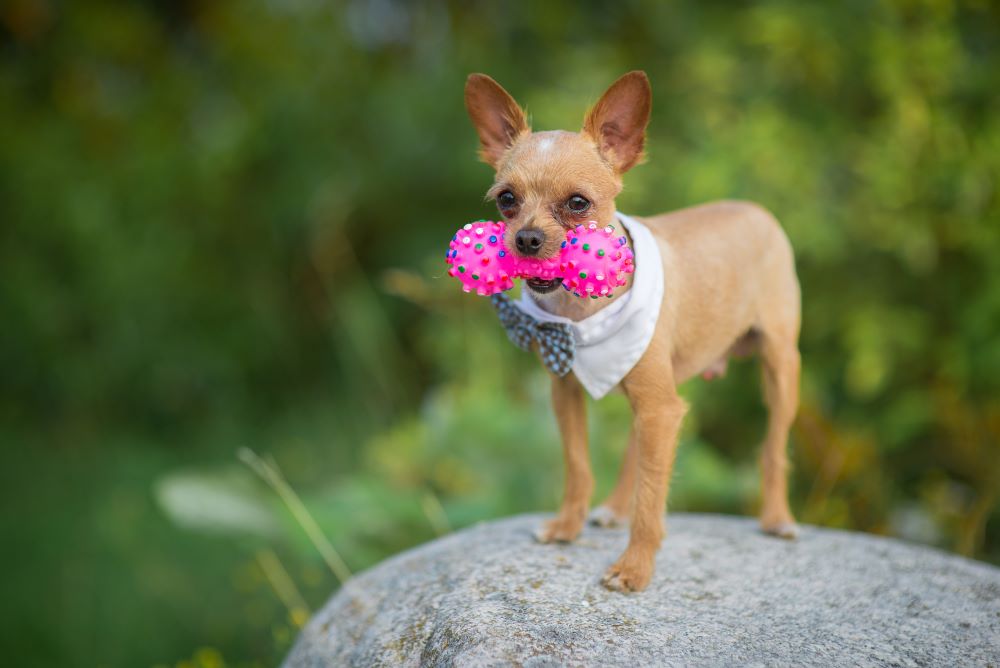Get Pet Insurance for your Cat & Dog

Zero
Documentation
Quick
Claim Process
Affordable
Premium
Terms and conditions apply*
- {{species}}
- {{indoorOutdoor}}
- {{suminsured}}
Chihuahua Dog Breed Characteristics & Information

Chihuahua dogs, with their diminutive size and larger-than-life personalities, have captured the hearts of dog enthusiasts around the world. These pint-sized pups are much more than their petite appearance suggests.
From their unique colours to their distinct personalities, there's a lot to uncover about these charming companions.
In this article, we'll delve into the fascinating world of Chihuahua dogs, exploring their characteristics, care requirements, training tips and common health issues.
What Defines Chihuahua Dogs?
Chihuahua dogs are undeniably cute due to their tiny size. Their special charm lies in their loyal and affectionate nature, though not all are noisy; some can be quiet. They can be suitable for first-time owners with proper care and training, given their small size and adaptable nature.
They are named after the Mexican state of Chihuahua and have a rich history that dates back to ancient civilisations. These dogs are believed to be descendants of the Techichi, a companion dog cherished by the ancient Toltec civilisation.
What are the Characteristics of Chihuahua Dogs?

Knowing the unique characteristics of Chihuahua dogs is essential for providing them with the care and attention they deserve.
- Lifespan: Chihuahuas, on average, have a lifespan of 12 to 18 years. Several Chihuahuas survive to become 18 years old, and a few even reach 20 years old.
- Height: These tiny dogs stand at a height of 5 to 8 inches tall, making them one of the smallest dog breeds.
- Weight: They typically weigh between 1 to 3 kg. Their petite size makes them well-suited for apartment living and as travel companions.
- Colour: Chihuahuas boast a spectrum of colours, ranging from solid shades like fawn, black, and chocolate to multi-coloured coats.
- Behaviour and Personality: They are often bold, confident, and can be overprotective. They can be good with children and other pets if raised properly.
- Living Conditions: Chihuahuas thrive in various living situations, whether it's a bustling city apartment or a suburban home with a yard.
- Coat: Chihuahuas have two coat types: smooth coat (short hair) and long coat. Both varieties require minimal grooming.
- Breed Characteristics: Recognized as a toy breed, Chihuahuas belong to the American Kennel Club's Toy Group.
- Temperament: Chihuahuas are known for their feisty yet affectionate nature. They may require gentle socialization to ensure a well-adjusted temperament.
- Barking: Chihuahuas are known for being vocal. While they might bark a lot, proper training can help manage their tendency to vocalise.
How to Train Chihuahua Dogs?

Chihuahuas are considered to be quick-witted and easy to train. Here are a few tips to train them:
- Socialisation: Positive behaviour development in Chihuahuas is helped by early and regular socialisation. Their growth into well-adjusted adults is ensured by exposing them to a variety of people, places, and situations.
- Litter Box Training: Bring your dog to the litter box after he wakes up, following meals, and at regular intervals during the day. Keep an eye out for cues indicating his need to go, such as sniffing or circling.
- High-Value Treats: Chihuahuas respond well to treats, and using high-value treats during training sessions can be highly effective. Choose treats that are small, tasty, and easy for them to chew.
- Figure Out Triggers: Understanding your Chihuahua's triggers helps prevent unwanted behaviours. Whether it's a specific sound, situation, or person, identifying and addressing triggers is key to a well-behaved Chihuahua.
- Swimming: While not all Chihuahuas are natural swimmers, introducing them to water gradually can be a positive experience. Some Chihuahuas enjoy swimming, which can be fun and exciting.
- Basic Cues: Teaching basic commands like sit, stay, and come is essential for communication and control. Consistent training sessions and patience are key to mastering these cues.
- Vocal Training: To address excessive barking, introduce vocal training exercises. Teach them the "quiet" command by using a calm but firm tone when they bark. Praise when they stop barking upon hearing the command
What are the Health Problems with Chihuahua Dogs?
Chihuahuas are considered to be a healthy breed, but for any owner, it is important to be aware of common health problems that they can be prone to. Here are six common health issues:
- Heart Disease: Chihuahuas can be susceptible to genetic heart issues, including heart murmurs and congestive heart failure. Regular veterinary check-ups help monitor their cardiac health.
- Luxating Patella: This genetic condition involves the dislocation of the kneecap, causing lameness in Chihuahuas. Regular exercise, a healthy weight, and monitoring their activity can contribute to preventing luxating patella.
- Dental Disease: Small breeds like Chihuahua dogs are prone to dental issues. Regular dental care, including brushing their teeth and providing dental chews, is crucial for maintaining oral health.
- Infections: Due to their prominent eyes, Chihuahuas may be more prone to eye infections. Regular eye cleaning and veterinary check-ups help prevent and address potential infections.
- Obesity: Being overweight can exacerbate health issues in Chihuahuas. Monitor their weight and adjust their diet and exercise routine accordingly to maintain a healthy body condition.
- Diabetes: Some Chihuahuas may be predisposed to diabetes. Monitoring their diet, ensuring regular exercise, and regular veterinary check-ups are key in managing and preventing diabetes.
How to Take Care of Chihuahua Dogs?
Due to their size, Chihuahuas are low-maintenance dogs. They do require a commitment to meeting their specific needs. Here's a breakdown of essential care aspects:
- Diet and Nutrition: Chihuahua dogs should only be fed premium dog food as they have faster metabolisms than most other breeds. All the vitamins, minerals, and nutrients required for their age should be included in a balanced diet.
- Feeding: A ¼ to ½ cup of dry, premium food should be provided twice a day to an adult Chihuahua. Additionally, avoid giving your dog access to food at all times of the day to prevent obesity.
- Grooming: Give your chihuahua a regular brushing, ideally once a week. Soft bristle brushes work well on both short and long hair types. Additionally, keeping their ears clean and nails trimmed contributes to their overall well-being.
- Exercise: Despite their small size, Chihuahuas are active dogs that need regular exercise. Daily walks, playtime, and mental stimulation are vital to keep them physically and mentally healthy.
- Keep Them Hydrated: Due to their small size, Chihuahua dogs are more susceptible to dehydration. Providing fresh water at all times is crucial, especially during warmer weather.
- Bathing: Chihuahua Dogs may not require frequent baths, but maintaining their hygiene is essential. Bathing them every 3-4 weeks, using dog-friendly shampoo and lukewarm water, helps keep their coat clean and healthy.
Chihuahuas may be small in stature, but their vibrant personalities and unique characteristics make them unforgettable companions. These petite dogs demand not just our attention but a thoughtful approach to their unique needs. Understanding their characteristics, be it in size, behaviour, or health considerations, is paramount to ensuring their well-being.












